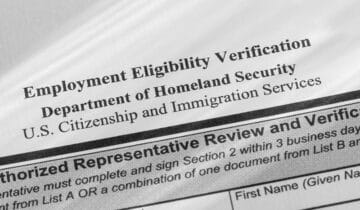It’s hard to dispute the fact that hiring is among HR’s most important and challenging responsibilities. When it comes to a candidate’s potential fit within the organization, there are so many criteria to consider.
Work history, experience, specific competencies for the job at hand, and soft skills like communication and critical thinking play a role in an employee’s ability to succeed. Then there’s the age-old chicken vs. egg debate about whether it’s more important to hire the candidate with the most relevant skills or the candidate who best fits the organizational culture. In an ideal world, every hire would be both a perfect cultural fit and possess the relevant skills needed for the job. But in reality, finding that perfect candidate profile is the exception, not the rule. While both skills and cultural fit are vitally important to building an effective team, for many successful organizations, hiring for cultural fit is the way to go.
The personality of an organization pulses through its veins. In a nutshell, culture values, assumptions, beliefs, norms, and the language a company adheres to. Culture comprises an entire social and psychological environment. Cultural fit is the way in which an employee connects with that culture. Organizational psychology guru Adrian Furnham offers this definition: “Cultural fit is where there is congruence between the norms and values of the organization and those of the person.” If you’ve ever been in a business environment that just didn’t mesh with your values and preferred work style, then you know how important cultural fit can be. When employees fit in and enjoy their jobs, it enhances the likelihood of their success as well as that of the organization.
Cultural fit is becoming an increasingly important dynamic when businesses consider prospective candidates.
The idea that hard skills can be taught and developed over time has paved the way for companies to explore the value of other less-obvious employment factors. In a 2017 Leadership IQ survey of 20,000 hiring managers, it was revealed that 46% of new hires failed within the first 18 months of employment. Of those failures, a remarkable 89% were due to personality or attitude issues while only 11% were for lack of skill. Given those statistics, it’s easy to see why hiring for cultural fit has become a priority in the recruiting strategies of so many companies. Here are five more reasons why the trend is growing:
- Embracing new values can’t be trained. Even if someone has decades of experience in a particular position, when they join a new company, they still have to learn new processes, procedures, and system requirements. But attempting to change how they work, learn, and interact with others is likely to be a futile effort. It’s the makeup of who they are and what values they bring to the table. Instead, focus on hiring employees who will mesh with the culture from day one.
- Better retention. It’s not surprising that employees who don’t fit in with company culture are far less likely to stay for the long term. For example, an introvert who enjoys working alone probably wouldn’t want to be surrounded by gregarious, talkative coworkers all day in an open plan office environment. A mismatch like that would likely cause a quick exit. In contrast, employees who are a good fit with their organization’s culture generally enjoy their jobs more, are more engaged, and are less likely to depart for other opportunities.
- Higher likelihood of job satisfaction. There’s probably not going to be much job satisfaction for employees who enjoy their work but hate the environment they are doing it in. By hiring for cultural fit, it puts employees in a position where they can potentially love what they do and where they work, resulting in the ultimate win-win.
- Improved productivity. Industrious collaboration is essential to business success and the sky is the limit when staff members work well together. On the other hand, a single employee who doesn’t work well with others can negatively impact the performance of an entire team. For example, someone who doesn’t communicate, lies, behaves irresponsibly, or doesn’t do his or her part. When an employee jives with the organizational culture, productivity is a natural byproduct.
- Better quality. Hiring employees who don’t fit well with the existing company culture often leads to poor work quality. But when workers reflect the core beliefs, attitudes, and behaviors that make up the organization, it creates a connection with the company. That results in employees who adhere to high standards and work hard to meet and exceed business goals.
What’s the culture in your company? Before you can determine if a candidate is a good cultural fit, you need to first determine the culture of your business. Is it laid back or formal? Highly innovative or more on the conventional side? Once you’ve determined your culture, consider the type of employee who will be most successful in your environment. For example, if your culture is very team oriented, look for someone who enjoys plenty of collaboration to get the job done. On the other hand, if your culture is quiet and less interactive, hiring someone who enjoys working alone would likely be a good choice.
While many candidates may look ideal on paper, only a few will be able to successfully integrate with your organization and contribute to its critical business objectives. Finding those select employees who mesh with your organization’s culture will be well worth your time and effort. Is your organization ready to embrace hiring for cultural fit? We can help! Please contact our experienced professionals to learn more.
About The HR Team: Founded in 1996, The HR Team is a Maryland-based human resources outsourcing firm committed to developing strategic, customized solutions that respond to the unique needs and cultures of organizations of all types and sizes. Available as a one-source alternative to an in-house HR department or on an à la carte project basis, the company’s flexible service models address the full spectrum of HR needs that many organizations struggle to address. The HR Team helps clients achieve their highest level of success by providing value-driven human resources services that leave them time to focus on what they do best: directing business growth and profitability. Headquartered in Columbia, Maryland, the firm serves all of Maryland, Washington, DC, and Virginia. To learn more about The HR Team, call 410.381.9700 or visit https://www.thehrteam.com/.







